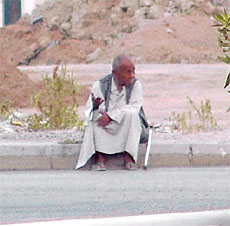JEDDAH, 31 July 2005 — An undercover Arab News investigation last November revealed that some types of beggars earn more than SR1.30 per minute. This amounts to almost SR15,000 per month if the beggar were to “work” eight hours a day, six days a week every month. One Indonesian beggar when apprehended in Jeddah, made headlines when it was discovered she had SR70,000 in her possession.
When traveling around the busy streets of Jeddah, people find themselves presented with truly horrific sights — a stump of an arm, grievously scarred faces and other hideous deformities, which out of pity, tend to make many reach for their wallet.
For some the decision to contribute is made instantly depending on how miserable the person presenting him or her self appears. Those with deformities do elicit the most sympathy, but so do children, and, of course, the elderly, presumed to be alone in this world, and too old to work.
There is an elderly beggar that has been a constant fixture in one Al-Rawdah district neighborhood for almost two years. He arrives just after Asr prayers from a nearby mosque to beg at the same spot just west of Al-Moraba Bridge.
Always dressed in a dirty thobe and gray vest, he sits on the curb, his cane by his side, raising a withered hand to passing motorists, begging them to stop. For all intents and purposes, he is indeed a sad sight.
Appearing too old to work, he evokes the sympathies of the many who pull up to him, sometimes stepping out of their cars to spare him the effort of standing.
During the summer months, a chatty, healthy, and seemingly well fed, yet bratty 12 year-old boy hovers around him.
Arab News met with the boy while he stood outside a grocery store keeping cool, a few meters away from where his grandfather was seated.
While sipping a fruit drink and eating an ice cream, he told Arab News: “We are Saudis and live in Al-Sabeel district. Everyday except Friday, my grandfather and I come here for a few hours to beg.”
When Arab News asked about where the boy’s father — the elderly beggar’s son — was, the boy simply said: “He’s at home.”
“What’s wrong with it?” he asked us. “No one will give my father money; he’s not young enough, or old enough to beg.”
When asked how he and his grandfather made the daily trip to Al-Rawdah district from Al-Sabeel district, one of Jeddah’s most crime-ridden and dilapidated, and back, the boy simply said, “By taxi,” a convenience many with gainful employment cannot afford on a daily basis.
The boy smiled and then laughed as Arab News came to the realization that traveling 28 km by taxi six days a week, must cost at least SR900 per month. “We can afford it,” he told Arab News.
Curious to find out what other conveniences this begging duo were able to afford, Arab News decided to follow them the following day.
Like clockwork, at eight o’clock on Thursday, the young boy helped his grandfather cross the street as they made their way to the local mosque. Signaling traffic to stop with one arm, while supporting his elderly grandfather with the other, he looked just like a boy scout.
Upon arriving at the mosque, the grandfather went inside and again, began begging after giving his grandson SR10 to spend at the nearby grocery store. Arab News followed him into the grocery store as he made a nuisance of himself running around, while buying two juices, two ice creams, one candy bar and a packet of cookies.
The boy remained outside the mosque while the congregation prayed, keeping busy talking with the fruit vendors, who gave him free samples.
Once prayers were concluded, the grandfather stepped out of the mosque and together they began walking toward Al-Rawdah Street looking for a taxi. Once away from the mosque and far from the congregation’s eyes, the boy suddenly took his grandfather’s cane and started twirling it over his head as he ran back and forth between his grandfather and the street.
When the boy finally stopped a taxi, the grandfather started jogging quickly toward it — completely unassisted — a distance of close to 20 meters. As they got in the taxi and made their way south, Arab News followed.
According to the odometer, the entire distance covered was 13.5 km, and according to the disgruntled taxi driver, the SR17 thrown at him by the little boy was not enough to cover the fare. “They told me SR20, and they only gave me SR17. I usually charge SR25 for a trip like this, but I saw that they were poor, and took pity on them,” the driver told Arab News.
Conservatively, the outgoings for the begging business this old man runs are around SR1,200 a month in transport and snack foods to his young minder. He works four hours a day. His “rent” for the four hours a day he is on site is about SR11.50 per hour. A large investment; there must be a substantial profit.
A Saudi female schoolteacher working at an elementary school in Jeddah, after an investment of several years training and the responsibility of educating the country’s future work force on her shoulders, receives as gross income an average of SR1.60 per hour. Her traveling expenses and subsistence comes out of that.


